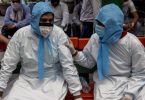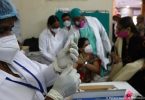Sitting on the veranda of his house, TJ Joseph, a retired professor of Malayalam, is busy browsing through a book occasionally making notes on a piece of paper with his left hand.
He is unperturbed by the noise outside his house where two police constables stand guard at Muvattupuzha in Kerala’s Ernakulam district.
His right palm was chopped off by a group of Popular Front of India (PFI) workers in 2010 for setting a question paper for an internal exam in Thodipuzha’s Newman College that the organisation claimed carried some blasphemous contents.
Though his palm was later stitched, he now uses his left hand to write. The “Taliban-model” attack was one of the initial crimes by PFI cadres that shook the southern state. While 13 workers of the outfit were sentenced to life, two assailants in the case remain absconding. He was dismissed from the college and in March 2014, his wife was found hanging at their residence.
On Wednesday, the Union government banned PFI and its eight affiliates for five years over terror activities.
“I have already pardoned my attackers. I am a victim and my sympathies are with other victims,” Joseph told reporters, who came to get his reaction on PFI’s ban. He did not want to suffer further by making any statements, the former professor said. When reporters insisted that his was among the major cases cited by the Centre to ban the fundamentalist outfit, he said he had “no ill will” towards anyone.
Banning the PFI was a political decision and let leaders and organisations respond to the development, he said. “I am not reacting now. Many of the victims of the PFI attacks are no longer alive. I would like to observe silence in solidarity with those victims,” he added.
On July 4, 2010, Joseph was waylaid and attacked by a group of PFI workers while he, along with his family, was returning home after the Sunday mass. After the incident, sweets were distributed in certain PFI strongholds in Malappuram and Kozhikode districts. Joseph was provided police protection after intelligence reports pointed at threat to his life.
His autobiography “Attupokatha Ormakal”, which was later translated in English titled “A thousand cuts”, won Kerala Sahitya Akademi award this year.
Not all victims of highhandedness of PFI were as forgiving.
“If authorities had banned the organisation last year, my husband would have been alive today,” said Arshika, the widow of Sanjith.
A local leader of the Rashtriya Swayamsevak Sangh (RSS), 27-year-old Sanjith was stabbed to death in front of his wife while they were riding on a motorbike at Elapully in Palakkad last November. His wife demanded that the government should also include Social Democratic Party of India (SDPI) — PFI’s political wing —in the banned list. “The SDPI is as rabid and extreme as PFI. Now all PFI activists will take shelter in the political party. We need peace,” she said.
In the last 10 months, Kerala has witnessed seven political murders — three workers of RSS, two from SDPI-PFI and two from the ruling Communist Party of India (Marxist). In Alappuzha, two leaders — SDPI secretary AS Shan and BJP OBC Morcha state secretary Ranjith Sreenivasan — were hacked to death in less than 12 hours on December 19 last year in what appeared to be tit-for-tat violence.
“My 22-year-old son was killed by PFI-SDPI workers for believing in an ideology. His head was almost severed,” said the mother of Nandu Krishna, who was hacked to death in Cherthala (Alappuzha) on February 25 last year. “Threat is far from over. Recently, some PFI activists came to my house and asked me not to pursue the case vigorously.”
Killings of Sanjith and Nandu Krishna were mentioned in the report of the Union home ministry while banning PFI and its allied organisations. Another case mentioned in the report was the murder of SFI leader Abhimanyu (20), who was allegedly hacked to death by workers of the Campus Front, PFI student wing, at Maharaja’s College in Ernakulam in 2018. His family members also hailed the decision to ban the PFI.







